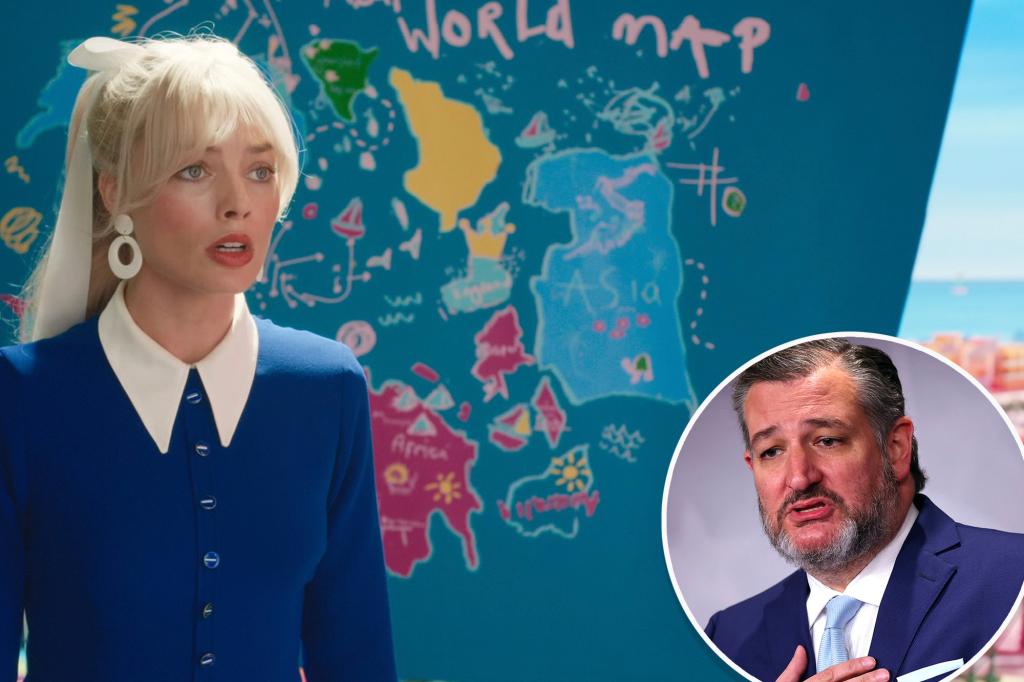Cruz Fires at Barbie Movie for Alleged Pro-China Bias: Geopolitics in Toyland!


Cruz Fires at Barbie Movie for Alleged Pro-China Bias: Geopolitics in Toyland!
In an unexpected development involving childhood icon Barbie and geopolitical tensions, Texas Senator Ted Cruz unleashed scathing criticism directed towards the upcoming “Barbie” movie. Labelled as an unexpected conduit for Chinese Communist propaganda, the animated film, scheduled to hit theaters on July 21, has stoked controversy for what Cruz argues is a subtly engineered, pro-China representation. At the heart of the contention are islands in the disputed South China Sea, regions that has stoked military tensions between Vietnam and China twice – in 1974 and 1988.
Cruz, not one to shy away from controversy, brought sharp focus to the depiction of the infamous “nine-dash line”, a geopolitical assertion by China that was ruled without any basis in international law by a United Nations court in 2016. The highly conflict-ridden Paracel and Spratly Islands, embroiled in China’s territorial claims and acknowledged as Vietnamese territories in international discourse, are represented within Chinese control by the film, according to the Senator. The overt pro-China stance implicit in this representation didn’t sit well with a primarily libertarian perspective that advocates limited governmental interference and champions human freedom.
Small wonder then, that the “Barbie” film has drawn the ire not only of Cruz, but also Vietnam – a country that has chosen to ban the film altogether. Social media witnessed the Senator doubling down on his outrage with the tweet “I guess Barbie is made in China….” on Monday – a symbolic indictment of what he perceives as a capitulation to Chinese propaganda. Deftly blending humor with an undercurrent of grave concern, Cruz’s accusations bring attention not only to the geographical implications of the much-debated “nine-dash line” but also to the larger, looming threat of Chinese influence over American film and entertainment, as summarized by a representative for Cruz.
In this high-stakes geopolitical chessboard, home to conflicting claims from the United Kingdom, France, and Australia, China’s assertive policies have long been contested. More critically, a slew of nations including Taiwan, the Philippines, Brunei, and Malaysia have laid claim to these energy-rich territories within the contested region, making it a geopolitical tinderbox.
The inclusion of the “nine-dash line” in the “Barbie” movie taps into previous controversies. Hollywood blockbuster, “Uncharted,” starring Tom Holland, was similarly barred from Vietnam for its depiction of the contested line. However, the correlation with the Barbie brand, a colossal entity in children’s entertainment, amplifies the seriousness of the issue.
In conclusion, the unfolding “Barbie” controversy resonates with a stark reality – the power, reach, and influence of cinema and popular culture. The animated saga is not just a summer entertainment blockbuster; it morphs into a battleground echoing with competing narratives and propaganda. The movie’s release is a potent reminder of the importance of vigilance against the subtle dispersion of geopolitical bias, especially when aimed at the most impressionable – our children. Amid the storm of conflicting claims and negotiations, when it comes to capturing impressionable minds, should we truly let Barbie lead the party?
Recent Posts
Kevin Costner Breaks Silence: ‘Crushing’ Divorce and Moving Forward
"Kevin Costner Breaks Silence: 'Crushing' Divorce and Moving Forward" "Hollywood Icon Kevin Costner Opens Up…
Walgreens Considers Major Store Closures Amid Retail Challenges
Walgreens Boots Alliance CEO Tim Wentworth announced potential closures of a "meaningful percent" of the…
Dave Grohl’s Concert Pause: Foo Fighters Frontman Puts Safety First
Dave Grohl, Foo Fighters frontman, halted a concert in Birmingham to address a crowd disturbance.…
Panthers’ Paradise: Florida’s Stanley Cup Celebration Reaches Legendary Status
The Florida Panthers have etched their names in NHL history not just for their on-ice…
Chanel West Coast’s Double Life: New Reality Show Reveals Star’s Struggles
By day, I'm mom. By night, I'm an artist," Chanel West Coast says in the…
Media Matters Funnels Six-Figure Sum to Board Member’s Firm
Media Matters for America, a nonprofit focused on correcting "conservative misinformation," paid $105,000 in 2022…